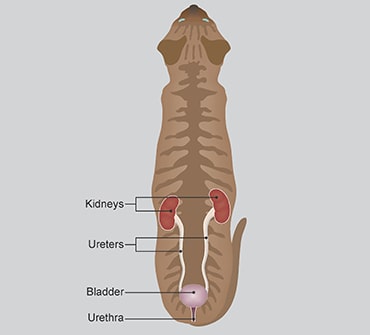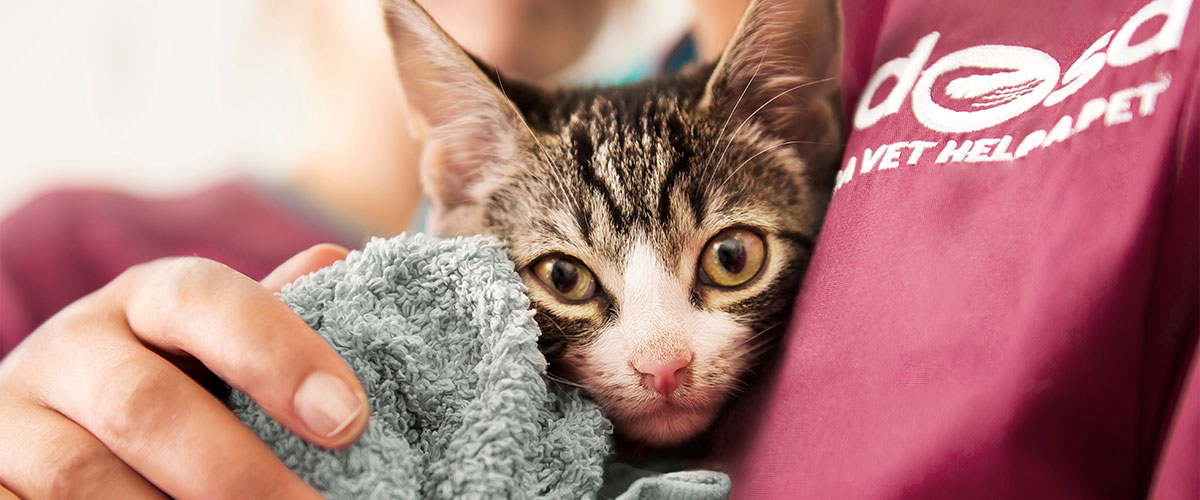Urine problems in cats
Overview
- Is your cat having problems peeing or visiting their litter tray more than usual? Passing blood stained urine or even struggling to pass urine at all?
- Problems with the urinary tract (waterworks) range from minor to life threatening.
- Contact your vet ASAP if you notice your cat is having problems peeing.
- Contact your vet immediately, for an emergency appointment if your cat is struggling to pee and seems distressed.
General information
Is your cat having problems peeing? Are they visiting their litter tray more often than usual? Are they passing very small amounts of urine? Do they strain or cry when they pee? Do they pee in places they shouldn’t or have pink/red blood tinged urine? These symptoms are all signs of a problem with their urinary tract (waterworks).
This page lists the common symptoms and conditions your cat could develop.
Symptoms
Is your cat unable to pee? Trying, but not passing any urine? In pain and distress? Call your vet for an urgent appointment. This is an emergency and could be a sign of a blocked bladder - never wait to see if these symptoms improve.
Most cats with a urine problem show obvious signs such as peeing in unusual places or visiting their litter tray several times an hour, however, if your cat is particularly shy or pees outdoors, it can be more difficult to notice the signs. Keep an eye out for telltale symptoms such as:
- Visiting their litter tray/going outside more than usual
- Peeing in strange places such as the bath, sink, bath matt or hard/cold floors
- Smelling of urine
- Discomfort or pain
- Unable to pass any urine
- Excessive cleaning around their penis/vagina
- Low energy (lethargy)
- Hiding away
- Drinking more
- Eating less
- A wet patch or blood around their private parts
- A swollen, tender tummy - contact your vet straight away

Kidneys produce urine, the ureters move it into the bladder, the bladder stores it and the urethra moves it out of the body
Causes
Urinary problems in cats can be caused by a variety of medical conditions (such as infections and bladder stones), but can also be caused by stress. This is because stress causes inflammation of the bladder lining. Common conditions of the urinary tract include:
- UTI (bladder infections) – If germs get into the urinary tract, they will cause infection, inflammation and pain.
- FIC (Feline Idiopathic Cystitis) – Inflammation of the bladder lining thought to be caused by stress (and other factors).
- Bladder stones – Solid, stone-like structures that develop inside the bladder. Bladder stones cause irritation, pain, infections and can even xxxblock the bladder.
- Blocked bladder – A blocked bladder is a very serious and extremely painful condition that stops a cat peeing. It is most common in males and often fatal if not treated quickly.
- Tumour – Bladder tumours are rare, they often bleed, and irritate the bladder and can cause a blockage.
- Nerve problems. Injuries to the spine can damage the nerves that control the bladder. This is very common after a road accident.
- Injury. A severe blow like a road accident can even burst the bladder or ureters.
When to contact your vet
WARNING
Is your cat unable to pee? Trying, but not passing any urine? In pain and distress? Call your vet for an urgent appointment. This is an emergency and could be a sign of a blocked bladder - never wait to see if these symptoms improve.
Contact your vet as soon as your notice any changes in your cat’s peeing habits and if possible, take a urine sample along to the appointment. Take a look at our video:
 Video found at youtu.be/rZmoiLXfDNY
Video found at youtu.be/rZmoiLXfDNY
Consider insuring your cat as soon as you get them, before any signs of illness start. This will ensure you have all the support you need to care for them.
Published: February 2020
Did you find this page useful?
Tell us more
Please note, our vets and nurses are unable to respond to questions via this form. If you are concerned about your pet’s health, please contact your vet directly.
Thank you for your feedback
Want to hear more about PDSA and get pet care tips from our vet experts?
Sign up to our e-newsletter
Written by vets and vet nurses. This advice is for UK pets only. Illustrations by Samantha Elmhurst.

